Movie Review – Rosemary’s Baby
Considered by many as a classic of the horror genre, Rosemary’s Baby hasn’t fared well in the years since its release. As much as it’s a template for many Hollywood films of its type, and Polanski’s direction is faultless, the critical thing to modern eyes is just how…. clunky it all seems. Mia Farrow’s stammering, helpless mother character is probably more a product of the time, a product largely seen as helpless by a society struggling to unshackle itself from rampant misogyny. At times spooky, at times frustratingly tepid, Rosemary’s Baby is certainly worth a look, but passage of time appears to have worn the edges off its once potent mix of unbridled paranoia and demonic illusion.
– Summary –
Director : Roman Polanski
Year Of Release : 1968
Principal Cast : Mia Farrow, John Cassavetes, Ruth Gordon, Sidney Blackmer, Ralph Bellamy, Victoria Vetri, Maurice Evans, Charles Grodin.
Approx Running Time : 136 Minutes
Synopsis: A young couple move into a New York apartment, where they set about trying for a family. What they don’t know, however, is that they have moved in next to some weird folks who have a hidden, evil agenda.
What we think : Considered by many as a classic of the horror genre, Rosemary’s Baby hasn’t fared well in the years since its release. As much as it’s a template for many Hollywood films of its type, and Polanski’s direction is faultless, the critical thing to modern eyes is just how…. clunky it all seems. Mia Farrow’s stammering, helpless mother character is probably more a product of the time, a product largely seen as helpless by a society struggling to unshackle itself from rampant misogyny. At times spooky, at times frustratingly tepid, Rosemary’s Baby is certainly worth a look for curiosity value, but the passage of time appears to have worn the edges off its once potent mix of unbridled paranoia and demonic delusion.
**********************
Pray for something interesting to happen.
Sometimes, the great films don’t live up to expectation. Or sentimentality. I’m not usually one to buck the trends of cinematic tidal swells, but it seemed to me as I sat down to prepare for Rosemary’s Baby that the film should at least be either chilling, thrilling, or some mixture of both. Directed by Roman Polanski, who at the time was pre-Sharon Tate murders, pre-rape charges and self-regulated flight from US jurisdictions, and was an early-career breakout hit for the Polish-French born film-maker. Based on the novel by Ira Levin, the film became an enormous commercial success, giving Polanski more clout within Hollywood, and making a star out of Mia Farrow, the lead actress cast as the titular Rosemary. For its time I have no doubt that Rosemary’s Baby was scary as hell, especially in light of its final scenes of pure horror that envelop the audience, but the question today is: how does it hold up now? For audiences who weren’t around to drink in its glory back in 1968. Is it still as scary, still as potent, still as frightening?
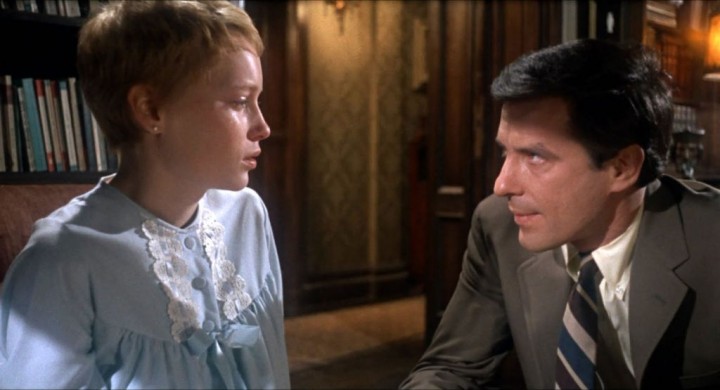
A young couple, struggling actor Guy and young housewife Rosemary Woodhouse (John Cassavetes and Mia Farrow, respectively) move into a recently available apartment in a block in New York City. The previous tenant was an old lady who passed away suddenly, and the realtor seems happy enough for them to simply move in immediately. On doing so, Rosemary befriends a fellow resident, Terry (Victoria Vetri), a recovering drug addict taken in my the Woodhouse’s immediate neighbors, Minnie and Roman Castavet (Ruth Gordon and Sidney Blackmer respectively). One evening, Guy and Rosemary return to their building to discover that Terry appears to have committed suicide by jumping from the window. Rosemary and Guy meet Minnie and Roman, who in their grief invite them over for a nightcap one evening. Rosemary isn’t particularly interested, finding Minnie a nosey busybody and Roman somewhat arrogant and aloof, yet Guy convinces her to give them a chance. Rosemary soon becomes pregnant, and it’s at this point that Guy, Minnie and Roman begin to take over the young woman’s life – gifts of a necklace (formerly given to Terri) and herbal drinks proscribed by the “best obstetrician in all of New York”, Dr Sapirsten (Ralph Bellamy), as well as a dramatic loss of weight and constant pain which go unaided thanks to off-handed “you’ll be okay in a few days” comments from the doctor, cause Rosemary to become paranoid. She begins to believe that Minnie and Roman, as well as their friends, and eventually Guy himself, are part of a witch coven next door, determined to steal her unborn child. Then, one evening after being drugged, Rosemary has a wild, demonic hallucination of Guy and her neighbors, which causes her to believe she has been affected by the black magic and which eventually drives her to drastic measures to save her baby.
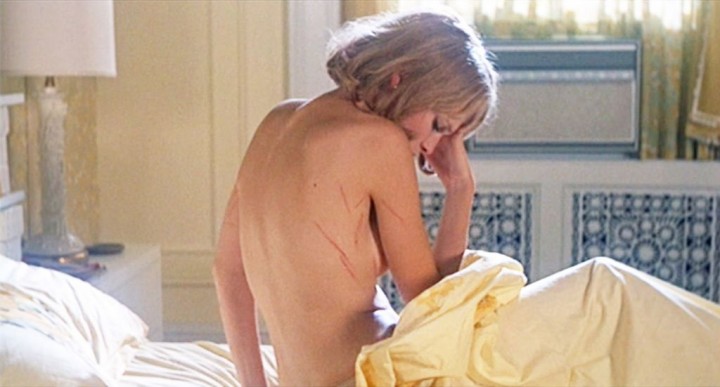
As I watched Rosemary’s Baby for the second time, I was struck with just how Hitchcockian it all felt; Roman Polanski, who had yet to win an Oscar or find himself fleeing America, obviously appreciated a lot of Hitch’s work, for the fingerprints of the master – in edits, framing and shot selection – are present throughout the film. That’s not to say that Polanski copied Hitch, nor was Hitch ever involved in the production, but you can feel Hitch’s shadow looming over Rosemary’s Baby’s subtle, character-driven tension like a deity. Rosemary’s Baby is most definitely a very tense, very well shot horror film, and even goes as far as to feature some bare breasts and unsubtle sexual liasion imagery throughout its running time. I’m sure this was shocking for the late 60’s mainstream cinema, but today it’s shocking for its restraint, rather than its inclusion. Polanski’s use of shadow, his use of framing and background focal pulling, and the lack of musical score throughout a large portion of the film, creates a tingling of tension, subtle and almost unwarranted, in the viewer.
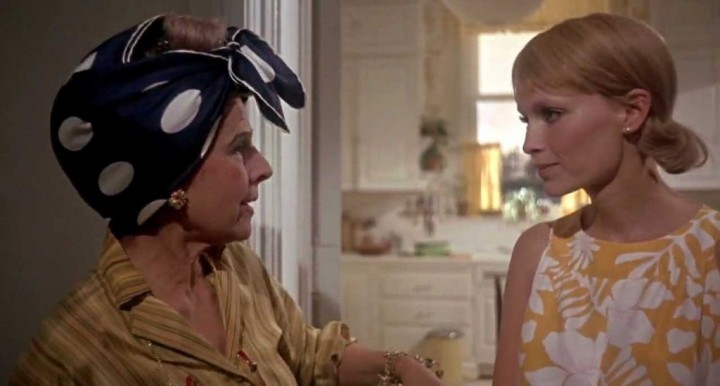
The story is rather generic by today’s standards, but modern viewers must remember that this film was the blueprint for a lot of successful horror films to come, and so must be affored respect in that regard. Paranoia and fear, coupled with demonic association and the satanic underworld are all elements of modern horror films to one degree or another, and Rosemary’s Baby makes use of the Devil’s Number (666) here and there, as well as apparently abrogating responsibility for marital rape, and the gradual build up of horror as the story builds to its gripping climax.
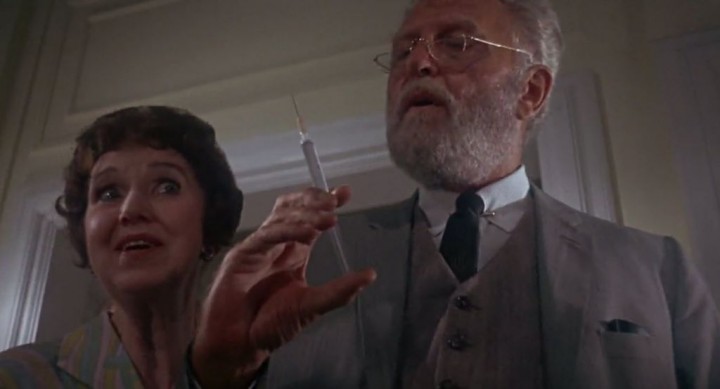
So what didn’t I like about Rosemary’s Baby? One of the crucial things that just flat-out annoyed me was Mia Farrow. I’m not sure whether it was her performance, or Polanski’s direction of the actress, but Rosemary is a wimp. Sure, it’s the 60’s, and women were only just beginning to get away from staying in the kitchen, but Rosemary lacks any kind of strength as a person. She’s timid, softly spoken and easily intimidated – not like modern women – and I guess the perfect candidate for demonic impregnation. But holy hell in a hand-basket, if any sensible married woman woke up from a nightmarish drug-induced hallucination to find her husband had had sex with her while she was passed out, the guy would find a knife buried into his crotch. Surely! No, after Rosemary wakes to find Guy has raped her, the lack of reprisal for this act is sickening – both from the story perspective and the film-makers perspective. In fact, as Rosemary becomes more paranoid (or, should I say, convinced about what’s happening to her) the less she seems to be able to break away. I know the film-makers had to make her somewhat weaker as a character to allow the story to progress, but it bothered me greatly that at no point did Rosemary try and make a break for it. Oh she does, to a certain extent, running to another doctor before he gives her up as a paranoid delusional, but if it was me? I’d be on a train for Cantfindmeville as soon as I could.
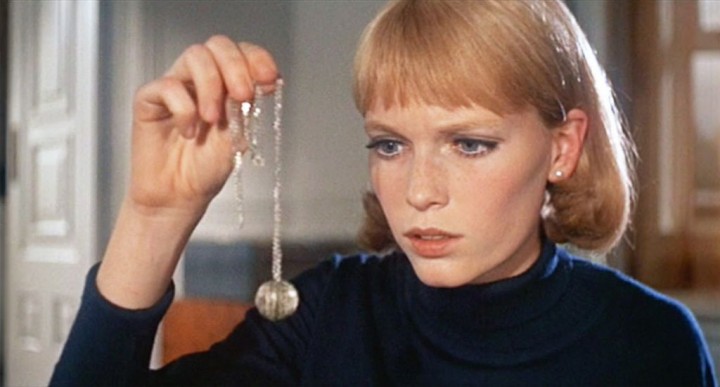
There is also a startling lack of energy to the early scenes in the film. While the concluding half is generally pretty tense, and largely well acted, the first half does begin to become a bit tedious as Rosemary and Guy meet and greet their neighbors and form a bond with them. I understand that character is half the battle in making a successful film, but this film spends almost too much time on the characters and not enough on getting to the scary stuff. Not that Polanski ever really seems to be in a hurry with this film – even in the more frantic moments towards the films shocking climax, there’s a languidity to proceedings that nullifies any tension or alarm. Which is perhaps more to do with my modern expectations asking too much of a fifty year old film than it is with the film itself.
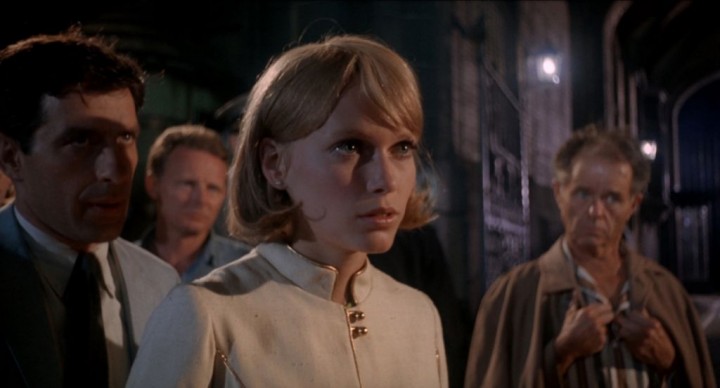
The cast do great jobs in their respective roles, with the exception of Farrow. John Cassavetes is suitably slimy and self-absorbed as Guy, who is sucked into the coven at the expense of his relationship with Rosemary. Ruth Gordon won an Oscar for her role as Minnie, which is okay I guess because she is probably the best character in the movie, but if she won an Oscar for that role, then Fran Drescher should have also won an Oscar for playing Nanny Fine for a decade. They’re essentially the same character, only four decades apart. Sidney Blackmer is eerie and creepy as Roman Castavet, providing the film with a few nice moments of off-balance characterization that’s as unsettling as it is effective. Watch also for Ralph Bellamie’s Dr Sapirstien, a thoroughly reprehensible doctor if ever there was one, and a young Charles Grodin puts in an appearance as another doctor Rosemary goes to see. The rest of the cast are periphery fillers, save for Maurice Evans as a suspicious Hutch, an old friend of Rosemary’s who sees her gaunt and frail appearance in the early stages of her pregnancy and questions whether she’s okay.
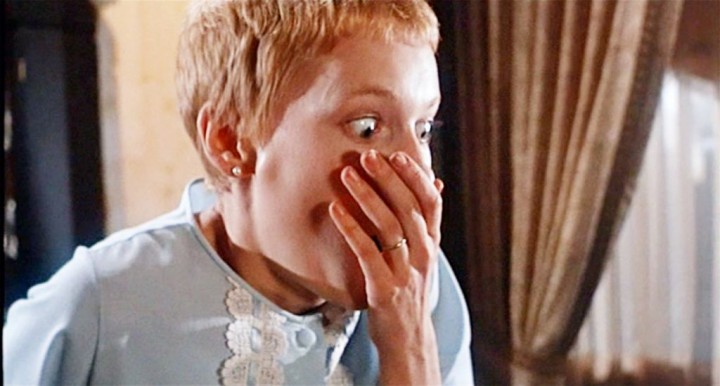
Perhaps the best discussion of the film should remain on the film’s climax, a descent into madness as Rosemary learns the fate of her child has something to do with Satan and the year 1966 – something I didn’t notice the first time I watched this, but during the film the characters all celebrate the turn of a new year – from 1965 to 1966 – and off in the background, as everyone’s calling out “happy 1966”, one of the miscellaneous characters hollers “year 1”, referencing the oncoming arrival of Satan on Earth as the beginning of a new epoch in human history. It’s subtle, but effective, because the clues to what’s happening are there, but not obvious as you watch the film. Rosemary’s discovery that her baby, whom she was informed had died during childbirth, is alive and well and residing in the Castavet’s apartment and being cared for by a variety of with coven members, isn’t human. The torturous cry of Rosemary, coupled with the rabid cries from the cult members overjoyed at the prospect of Satan’s return, is heartbreaking, and yet it’s what follow on from that that just kills this film stone dead.
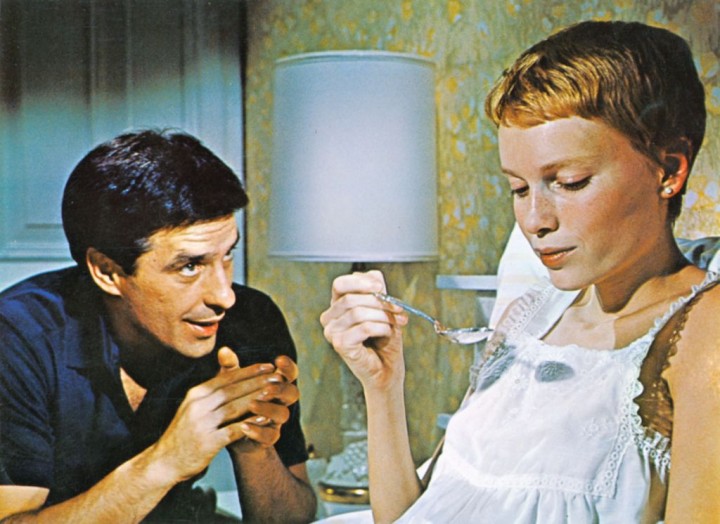
Rosemary’s goes from hating these people with a passion, trying to escape them and break free from their control, only to decide after learning the horrible truth about her baby (apparently she was raped by an avatar of Satan himself….. yeah, I know!) that she’ll stay and help raise the child. Now, I’m all okay with downbeat and enigmatic endings, but the film never deserves the ending it gets. Rosemary’s change of heart, perhaps because she’s a new mother, seems like it comes from nowhere, a complete reversal of the previous 2 hours of film where she’s been living in fear and paranoia. The fact the film never actually explicitly says what she ends up doing (after the final frames, does she scoop up the demon child and murder it, escape with it, or jump out the window herself?) is both confounding and frustrating. Backed up by past experience, I’d have expected Rosemary to grab that kid and throw it the hell out the window or something, but alas, we’ll never know.
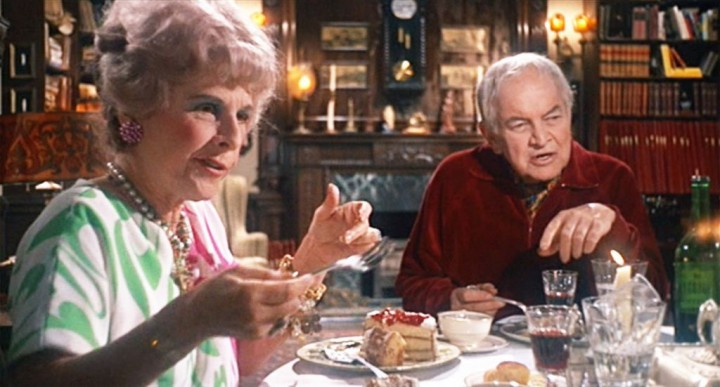
Aside from Farrow’s grating performance (which is assisted in being better than it could be by some wonderful costuming and makeup), and the tepid pacing in the opening half, Rosemary’s Baby just feels too stagey for my liking. I know, I know, I’m casting modern expectations upon a film that shouldn’t be asked to produce that kind of quality, but if films such as The Birds and The Exorcist can still be spine-chillling and terrifying decades down the track, perhaps it’s not entirely unreasonable for a more cerebral thriller to accomplish the same. As it stands, I was left feeling thoroughly “meh” by Rosemary’s Baby. The film lacks a naturalness that prevents it from feeling real, and that’s a critical problem for me. It feels manufactured.
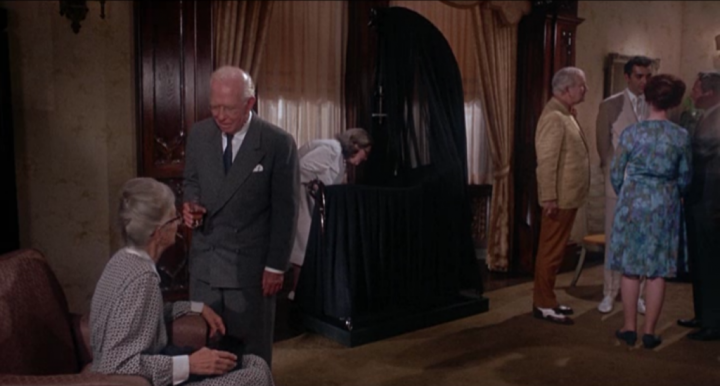
I know I’m gonna be flamed for saying it, but Rosemary’s Baby is a bit of a fizzer. The only standards by which I can judge it are today’s, and so my final score probably reflects that more eloquently than any phrasing or excuses I might offer. It might have struck fear into audiences back in 1968, but these days it’ll barely raise the pulse. Farrow annoyed the hell out of me, the story is nowadays largely a parody of itself, and the only thing preventing the whole movie from descending into farce is Polanski’s subtle, razor sharp attention to detail. Simply put, I just found myself utterly bored by it all, and frankly, couldn’t really think of anything more positive to say.


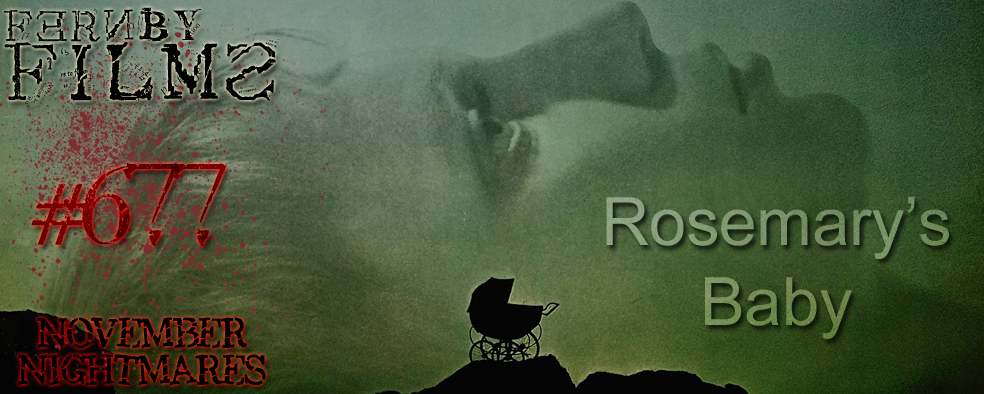






 The Rosemary Code
The Rosemary Code

I agree as well. I've only seen this once, when I was a teenager (so like 15 years ago), and I thought it was boring and was struggling to see why it was so well-regarded. I've always thought that I should give it another chance as an adult. Maybe one day. I can't say that I'm all that excited to do so. I recently saw an earlier Polanski "classic" Repulsion, and that left me a bit underwhelmed as well. He's real hit or miss for me.
My recent post Shadow of a Doubt (1943)
Where I think Rosemary's Baby falls over is in that it's so dated – which isn't a fault of Polanski or anybody else, really – and the acting style and performances of the cast are firmly entrenched in the 60's. It never feels "natural", if that makes sense. I often find this a problem while watching older films, in that the veil of fantasy doesn't feel as believable as it does in more recent material. Hope that makes some kind of sense. Thanks for stopping in, Will!!
I have to agree with you on this one. Watched this for the first time a couple of years ago and thought it was a weird movie and like you say it does not really raise a pulse, it just feels very weird.
My recent post The Monday Question: Educate!
I'm actually surprised anyone agrees with me, frankly. I fully expected a "how DARE you" stream of comments about how this film changed peoples lives, how awesome it is, how truly scary it is… etc.
Now it seems like I'm not the only one who finds this film a bit of a bore. Thanks Nostra, for joining me in disagreeing with the establishment!